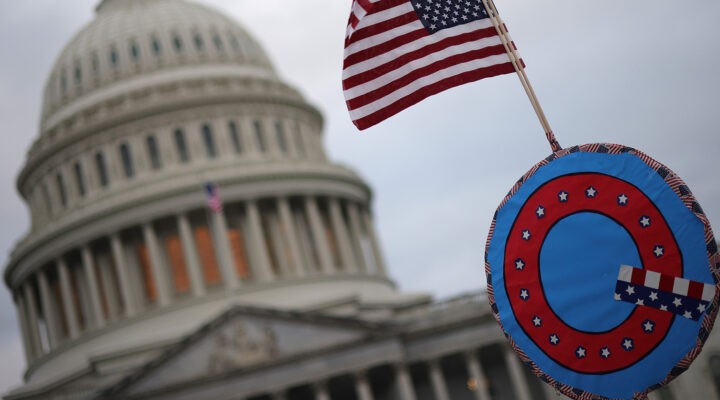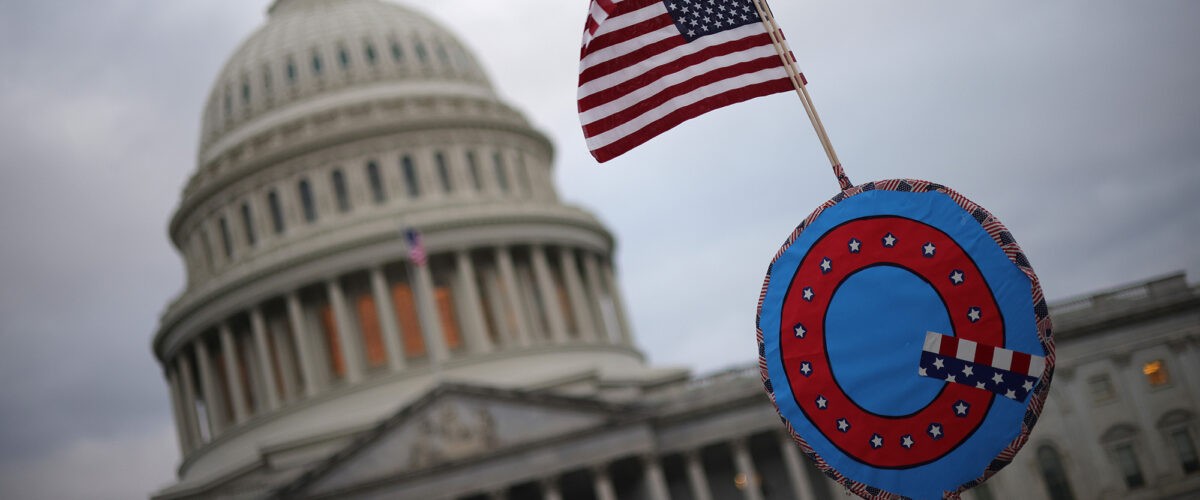Media consumption remains the single most significant predictor of whether a person believes QAnon conspiracy theories, according to new longitudinal data from Public Religion Research Institute.
Having tracked American views of QAnon’s core beliefs over the course of 2021, PRRI found a slight uptick in the percentage of QAnon believers from the beginning of the year to the end. However, the proportion of Americans who believe or are at least open to believing held mostly steady throughout 2021.
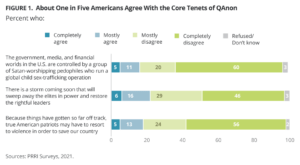 QAnon is a loosely held conspiracy movement associated with former President Donald Trump. The most common tenets of its followers include belief that a network of Satan-worshipping pedophiles control the government and media, that a coming “storm” will sweep them out of power, and that Trump has been secretly fighting to unmask the evildoers who control the political and economic systems of power.
QAnon is a loosely held conspiracy movement associated with former President Donald Trump. The most common tenets of its followers include belief that a network of Satan-worshipping pedophiles control the government and media, that a coming “storm” will sweep them out of power, and that Trump has been secretly fighting to unmask the evildoers who control the political and economic systems of power.
The ideology has taken such strong root with a minority of Americans that despite Trump leaving office, despite major social media platforms banning QAnon content, and despite the mysterious figure head of the movement disappearing from the internet — despite all these things the movement has continued to thrive.
Characteristics of QAnon believers
And now, with a year’s worth of data in hand, PRRI confirms that most characteristics of who is likely to be a QAnon believer have not changed over time.
Media consumption remains by far the strongest predictor of adherence to QAnon. “Americans who most trust far-right news outlets like One America News Network and Newsmax are nearly five times more likely than those who most trust mainstream news to be QAnon believers,” the firm reported. “Also, Americans who most trust Fox News are about twice as likely as those who trust mainstream news to be QAnon believers.”
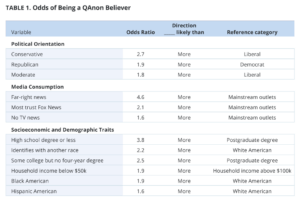 While that trait far outshines all others, a secondary trait also is common among QAnon believers: Possessing only a high school diploma or less.
While that trait far outshines all others, a secondary trait also is common among QAnon believers: Possessing only a high school diploma or less.
“Compared to Americans with postgraduate degrees, Americans with a high school degree or less are nearly four times more likely to be QAnon believers, those with some college experience but no four-year degree are two and a half times more likely,” PRRI said.
A third factor — but with about half the odds associated with media consumption — is to identify as a conservative.
Taken together, the three most notable descriptors of a QAnon believer across 2021 were watching far-right news outlets, holding only a high school diploma or less, and identifying as a “conservative” whether that be as a Republican, Democrat or independent.
However, QAnon believers are twice as likely to be Republicans as to be Democrats.
Also, while QAnon believers most typically are white, there are larger-than-expected shares of believers who are Hispanic and Black.
How the study was done
PRRI’s study was simple. In four surveys across 2021, it asked respondents to assess their levels of belief in three core tenets of the QAnon movement. They were asked whether they completely agree, mostly agree, mostly disagree, or completely disagree with these statements:
- The government, media and financial worlds in the U.S. are controlled by a group of Satan-worshipping pedophiles who run a global child sex-trafficking operation.
- There is a storm coming soon that will sweep away the elites in power and restore the rightful leaders.
- Because things have gotten so far off track, true American patriots may have to resort to violence in order to save our country.
Across the four surveys, more than one-fifth (22%) of Americans mostly or completely agreed that there is a storm coming (22%), while 18% said violence might be necessary to save our country and 16% said the government, media and financial worlds are controlled by Satan-worshipping pedophiles.
PRRI then created a composite to measure and identify three groups:
- QAnon believers completely or mostly agreed with these statements.
- QAnon doubters mostly disagreed with these statements.
- QAnon rejecters completely disagreed with all three statements.
Using this framework, 16% of Americans in 2021 could be labeled QAnon believers, 48% as QAnon doubters and 34% as QAnon rejecters. The share of QAnon believers increased slightly (one point) from March to October.
Demographics of QAnon believers
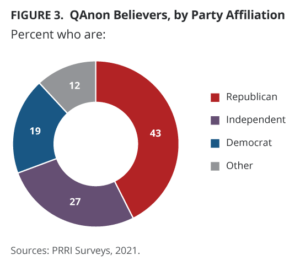 The longitudinal study found one-fourth of Republicans (25%) to be believers, compared to 14% of independents and 9% of Democrats. “Nearly half of Republicans (47%) who most trust far-right news outlets like One America News Network or Newsmax are QAnon believers, along with one-quarter of Republicans who most trust Fox News (26%) or do not trust TV news (26%). Fewer (18%) of Republicans who most trust mainstream media outlets like CNN, MSNBC, public television, or broadcast news are QAnon believers,” PRRI noted.
The longitudinal study found one-fourth of Republicans (25%) to be believers, compared to 14% of independents and 9% of Democrats. “Nearly half of Republicans (47%) who most trust far-right news outlets like One America News Network or Newsmax are QAnon believers, along with one-quarter of Republicans who most trust Fox News (26%) or do not trust TV news (26%). Fewer (18%) of Republicans who most trust mainstream media outlets like CNN, MSNBC, public television, or broadcast news are QAnon believers,” PRRI noted.
Surprisingly, however, about one in four Hispanic Protestants (27%) are QAnon believers, as are 17% of Black Protestants and Black Catholics. Hispanic Catholics are nine points less likely to be QAnon believers than Hispanic Protestants.
The difference between white evangelical Protestants and white mainline Protestants is stark: 23% of white evangelicals are QAnon believers, compared to 14% of white mainline Protestants.
Yet the PRRI data show adherence to QAnon’s conspiracy theories has permeated some segment of all religious groups, from white evangelicals to Mormons to Buddhists and Jehovah’s Witnesses.
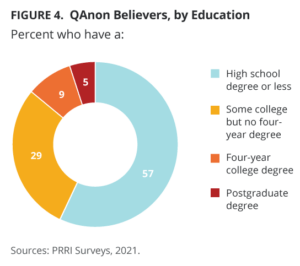 Seen another way, in a representative group of 10 QAnon believers, two would be white evangelical Protestants, two would be religiously unaffiliated, one would be white mainline Protestants, one would be a white Catholic, one would be a Hispanic Catholic, one would be a Black Protestant, and the rest would be a mixture of Hispanic Protestants, other non-Christian religions, other Christian denominations, other Protestants of color, and other Catholics of color.
Seen another way, in a representative group of 10 QAnon believers, two would be white evangelical Protestants, two would be religiously unaffiliated, one would be white mainline Protestants, one would be a white Catholic, one would be a Hispanic Catholic, one would be a Black Protestant, and the rest would be a mixture of Hispanic Protestants, other non-Christian religions, other Christian denominations, other Protestants of color, and other Catholics of color.
However, religion aside, a majority of QAnon believers (58%) are white and 20% are Hispanic. Just 13% are Black.
PRRI found little variation in age categories among QAnon believers compared to the general population. Believers are most likely to have household incomes of less than $50,000 per year, to live in the suburbs and to live in the American South. However, believers are found in all areas of the nation and is urban and rural areas too.
Other beliefs
Generally, QAnon believers in 2021 shared these attitudes:
- Negative views of the Democratic Party and positive views of the Republican Party.
- Belief that the Republican Party “is trying to protect the American way of life from outside threats.”
- Belief that the Democratic Party “has been taken over by socialists.”
- Negative perceptions of President Joe Biden and his job performance.
- Positive views of Trump and the belief that he is a “true patriot.”
- Certainty that the 2020 presidential election was “stolen” from Trump despite no evidence to that effect.
- Belief that Trump, white supremacists and QAnon believers were not responsible for the Jan. 6, 2021, insurrection at the U.S. Capitol.
- Belief that America is “in danger of losing its culture and identity.”
- Belief that God has granted America a special role in human history or that “things have changed so much that I often feel like a stranger in my own country.”
- Certainty that believing in God is very or somewhat important to being “truly American.”
Is QAnon a prophet or provocateur? And how should Christians respond? | Analysis by Aaron Coyle-Carr
The second coming of JFK Jr. and other unrealities: Signs of our times | Opinion by Bill Leonard
Why are Christians so susceptible to conspiracy? | Analysis by Andrew Gardner

